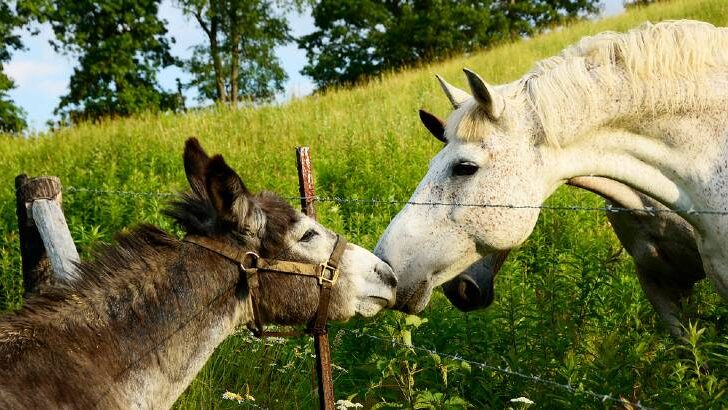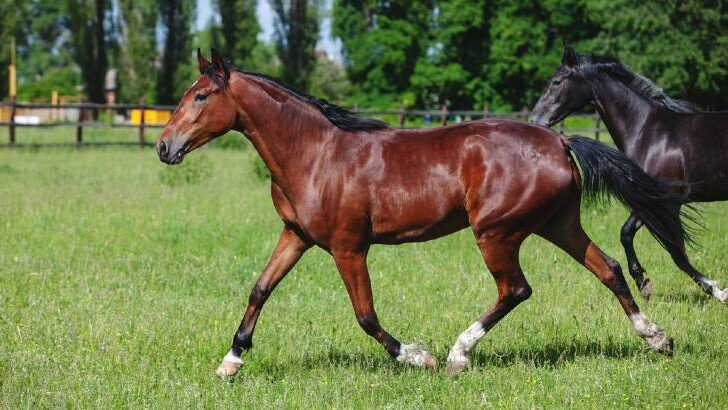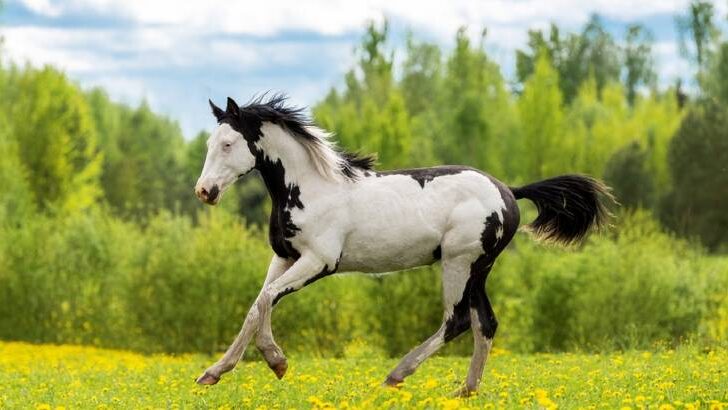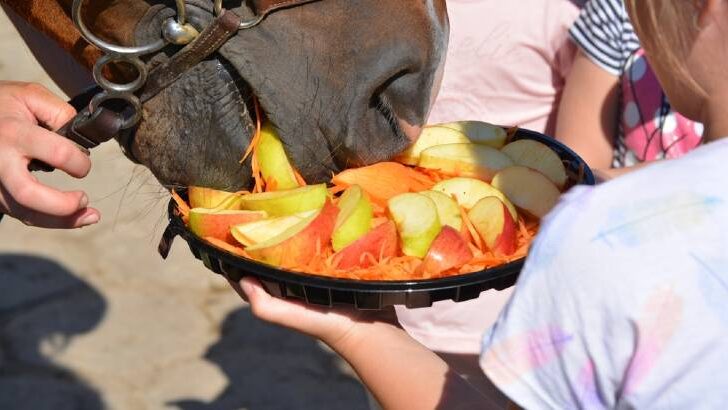Affiliate Disclaimer
As an Amazon Associate I earn from qualifying purchases. It helps me keep the website going. Thank you for your support.
Horses are social animals – they love to play, sleep and bond with each other. Horses are also curious and seem to enjoy meeting and making new friends. But do horses only form bonds with other horses? Or can other animals be good companions for your horse?
By far, the best companion for your horse is another horse. If keeping two or more horses is not an option, you must consider other animals as companions for your horse. These include cows, sheep, goats, donkeys, llamas, and alpacas. If you are in need of a smaller companion, then dogs, cats, and even chickens can help fend off equine loneliness.
Horses are social animals and suffer from health issues if they are kept alone. Read on to learn more about how to choose a good companion for your horse.
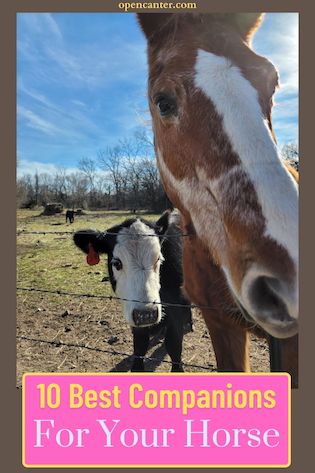
Why Do You Need Companions for Your Horse?
Horses are social creatures and evolved to live in herds in the wild. Horses are also prey animals, and herd life provides better protection from predators. A horse’s need for a companion stems directly from their wild ancestors.
While today’s domesticated horses do not face the same threats, they still have the same herd mentality. For a horse, having a companion is directly linked to their safety.
Horses who are kept alone usually experience more stress and anxiety. This is because they are constantly on alert for predators. They may also rest less, as there are no other animals around to keep watch.
Additionally, horses do actually develop friendships. Just like humans, horses get lonely. Because they are social animals, having a companion is essential for their mental well-being. Horses who are kept alone can also experience boredom or depression.
What Should You Consider Before Choosing Companions For Your Horse?
There are many things that you need to consider before choosing what type of companion is best. These considerations need to put your horse’s welfare first, however often involve other factors. These include available land, finances, and what activities you do with your horse.
The amount of land available where you keep your horse will likely be the first determining factor. If you have lots of land available, then you won’t be limited. However, smaller acreages may be limited to choosing smaller companion animals.
You need to have enough land for your chosen companions, in addition to the area already allocated for your horse. For example, you currently have one horse living on an area of two acres. This will mean your property must be three acres or more in total. This is to ensure that you have space to support two animals.
Finances will be another important limiting factor. This will determine what sort of companion you can afford. This is not only in the initial purchase, but to cover ongoing feed, medical and upkeep costs. Some animals cost more to purchase than others but cost less to keep.
Lastly, you need to think about what you like to do with your horse. If you regularly take your horse to competitions, then the companions will be left home alone. This is not ideal, as it will be a very stressful time for the animal left behind. In this instance, you are better off getting two companion animals. Alternatively, you could take the companion animal with you.
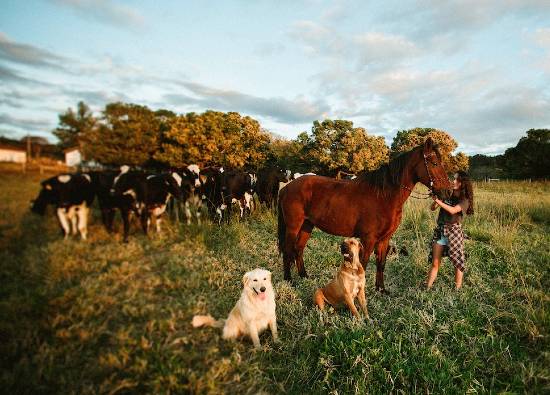
What Should You Consider When Deciding What Type of Companion to Get?
If you purchase another horse to use as a companion, you already know what to expect. You will know that both horses can eat the same feed and have similar upkeep requirements. You will also already have the skills to handle the new horse, as well as the equipment required to do it.
What About Choosing a Companion That Isn’t a Horse?
When choosing a different animal as a companion, consider the facilities you currently have. What type of fencing do you have? If it is post and rail, you will be able to contain a cow, but a goat will easily escape. Fencing can easily be upgraded or replaced; however, this can be costly.
Other facilities, like holding pens, might be required for feed time if your horse or the companion is overly dominant. It may also be required if you need to feed your companion specific feed. This is because feeds for other animals can have additives that are harmful to horses.
Different animal species also require different upkeep tasks. For example, sheep and alpacas will need to be shorn each year. If you do not have the facilities and skills yourself, you need to find someone to do this for you.
You will also need to learn how to handle and train your new companion animal. While some animals can be trained in a way similar to horses, others are very different. For example, from the outside donkeys appear very similar to horses. However, they require a slower approach in training, as they are naturally more cautious. They also require less repetition than horses to learn something new.
Lastly, it is always recommended that you get either a female or neutered male. This applies regardless of what type of animal you choose. Males who have not been neutered can be aggressive and difficult to handle. They are not well suited to being companion animals.
What Are the Best Companions For Your Horse?
With all of the above taken into consideration here are some of your options:
1) Other Horses
Nothing makes a better companion for your horse than another horse. They behave and communicate the same way and have the same diet. While horses may form bonds with other animals, they will always form a relationship with another horse.
Getting another horse is a big commitment. Even if you only buy a miniature horse, they still require careful management. Ponies need different management than horses and are prone to quickly becoming overweight. This can lead to diseases such as laminitis, which can be challenging to treat.
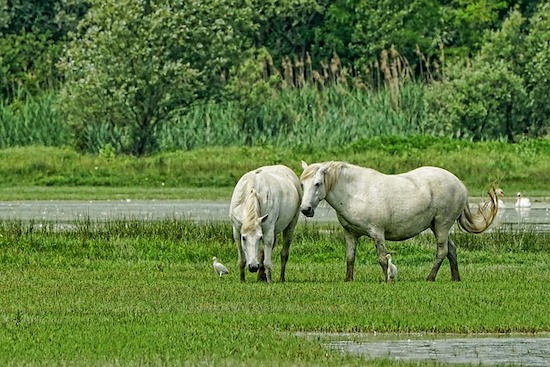
2) Cows
Cows make great companions for horses as they behave in ways that are very similar. Both are grazing animals; however, cows will spend less time grazing than horses. This is because of how their digestive system is designed.
Cows will often also eat areas of pasture that horses avoid. This can help reduce the need for mowing as the field is grazed more evenly. Being prey animals, cows also share the same herd mentality and fight/flight response as horses. This is part of what makes them a great companion for your horse.
However, if you plan on getting a cow to keep your horse company, there are a few things to consider. Firstly, you need to have enough room for a cow – generally allow one acre of land per cow, on top of the land allocated to your horse. If you need to feed hay because there is not enough grass, cows can be fed the same hay as your horse. You can read more about grazing cows and horses together here.
If you purchase cow feed, such as a grain mix or fescue hay, this must not be given to your horse. Packaged cow feed mixes often contain additives that are harmful or even lethal to horses. You will likely need to separate your horse and your cow for feeding time. This is to make sure your horse doesn’t eat the cow’s feed (source).
Cows also require stronger fencing to keep them in. If you have a standard wire or post and rail fence, you may need to add an electric wire to stop your cow from pushing on the fence and escaping. Other solutions, like barbed wire, work for cows but are not suitable for horses.
3) Sheep
Getting your horse a sheep as a companion is another good option. Sheep are a lot smaller than cows, and so require less feed. However, you still need to ensure you have enough land for a sheep. Allow half an acre per sheep, on top of the land allocated for your horse.
Sheep can help improve pasture health, as they will often eat plants that horses won’t. They also share the same fight or flight response as horses, and like to live in a group. Sheep are also surprisingly easy to train.
Careful research is required when choosing a breed of sheep. Sheep who grow wool will need shearing each year, which requires specialized equipment. Alternatively, you can choose a crossbreed type of sheep with a different coat that sheds each year.
It is also not recommended that you choose a breed of sheep that has horns. Some sheep learn to headbutt, and this can cause serious injury to your horse if the sheep has horns!
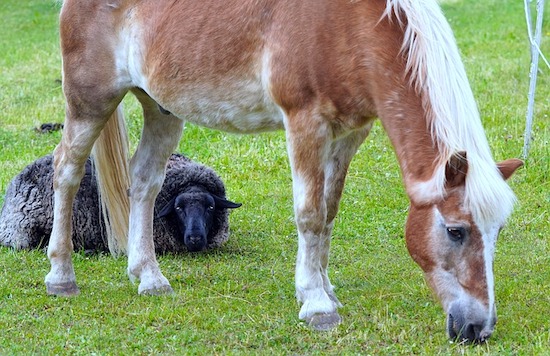
4) Goats
Similar to sheep, goats are another great companion option for your horse. They are useful to improve pasture health, as goats will often eat plants that horses avoid. If there is not enough grass available, goats will do well on the same hay that your horse eats.
Most goats don’t need any extra feed, but you can buy specialized goat feed. Be careful at feed time, as goat feed can contain additives that are harmful to horses. Care also needs to be taken as goats are known to eat many things they shouldn’t. These include things like fence posts or rails, poisonous plants, or chewing on troughs or feed buckets.
Goats require a slightly different environment than horses. They are very curious and active animals and like to run, play and climb. Providing them with toys and things to climb on will help keep them occupied.
Because they are natural explorers, goats are also excellent at escaping. The fence used for your horse will likely need upgrading to make sure your goat stays in. You will need a fence that is at least four feet high and is completely enclosed from top to bottom. Goats can easily crawl through gaps in wires or rails.
Be aware that some horses can find goats overly rambunctious. Being climbers, goats may attempt to climb onto your horse if the opportunity arises. They are also known to headbutt, which can cause injury if the goat has horns.
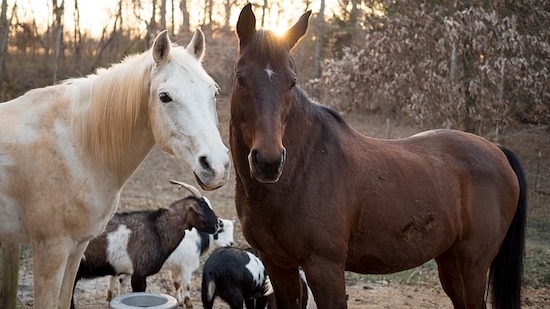
5) Donkeys
Donkeys can be excellent companions for horses. They also have the added bonus of being good guard animals. This is because although they share the same fight or flight response as horses, they have a much stronger fight response. You can read more about some of the differences between horses and donkeys here.
This is why donkeys often appear aggressive towards dogs; as the donkey thinks the dog is a predator. They will stand their ground and strike out with their front feet, or chase dogs away. If you have a dog, getting a donkey as a companion for your horse may not be appropriate.
Donkeys have a diet that is very similar to a horse. They will usually be able to eat the same hay as your horse. However, donkeys have evolved to survive on high-fiber feed that is relatively low in nutritional value. This means they do best on straw or late-cut hay, and generally should not be fed any grain or sugary feed mixes.
Donkeys come with some special shelter requirements. Their coat is not naturally waterproof like a horse, and they do not cope as well in cold temperatures. Donkeys should always have access to a shelter and may need training to accept a rug in cooler climates (source).
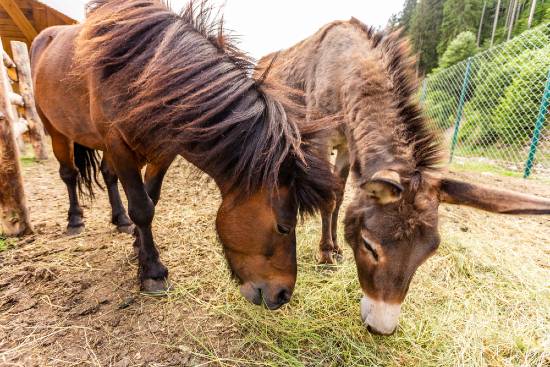
6 & 7) Llamas and Alpacas
Getting either a llama or an alpaca as a companion for your horse can be a good option, but careful consideration is required.
For starters, the key difference between llamas and alpacas will guide your decision. Alpacas were bred for their fleece and meat, while llamas were bred as pack animals. Alpacas tend to have a stronger herd mentality. This means it is recommended to get two alpacas, even if there are other animals around.
On the other hand, llamas are more independent and are more likely to be able to bond with other species. They don’t have as strong a herd mentality within their own species. Alpacas also require shearing each year, whereas llamas do not.
Both species share a similar diet to horses and can be fed the same feed as your horse. In most cases, they don’t require specialized fencing.
Therefore, llamas are likely to be a better option as companions for your horse. Alpacas will make good companions; however, you will usually need to have two alpacas to ensure their well-being.
But what if you don’t have a huge amount of room for another animal? Perhaps you are looking for pint-sized companions for your horse. Luckily you have some options, here are three of them…
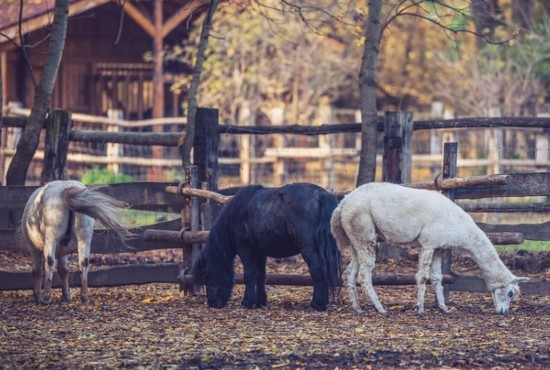
8) Dogs
Dogs can make excellent companions for horses, however, they must be introduced carefully. Your dog must understand that they are not to chase or nip your horse. Likewise, your horse needs to understand that your dog poses no threat.
Most horses will be curious about dogs; however, it will only take one bad experience and the horse will become fearful. It is important to make sure that your dog is well-behaved. Dogs that bark excessively, bite, nip or chase horses do not make good companions.
If your horse is scared of dogs, a slow introduction to a calm, well-behaved dog may cure the fear. However, some horses do not ever get over their fear. These horses may chase, bite or kick the dog as they see the dog as a predator. For these horses, it will be best to choose a different companion animal.
Once introduced properly, dogs are a popular option for those who trail ride or travel to compete. Dogs enjoy coming along on the trail ride or can travel in the float with your horse. They are also usually welcome at horse events, provided they are kept on a leash.
Having a dog around also has the added benefit of extra security. Most dogs will announce when a stranger arrives by barking.
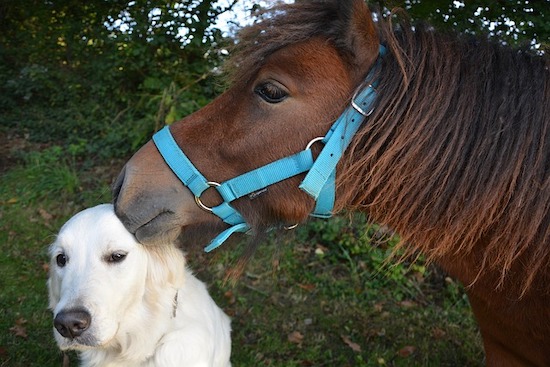
9) Cats
Cats can make great companions for a horse. While they are generally not group or herd animals like horses, their sense of curiosity is similar. They make great companions for stabled horses, as they like to spend lots of time curled up in the hay inside.
Just like humans, animals are drawn to other animals they share similarities with. Horses and cats form bonds as a result of their curious natures. Most horses will greet a cat by sniffing or nuzzling them. In most instances, the cat appreciates this greeting.
Cats show affection by bunting their heads against you, similar to what happens when a horse nuzzles you. Both animals show affection towards each other in a similar way. Some cats enjoy sitting on the backs of horses or licking their coat (source).
Because horses are much bigger than cats, some cats take a little while to learn there is nothing to fear. Once they have learned that horses are friendly, they will often choose to hang out nearby.
Having a cat or two in your barn also has the added benefit of rodent patrol. Cats are a great way to control mice populations, which can damage expensive feed and hay.
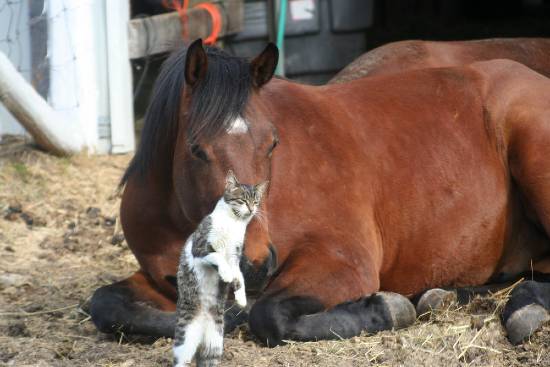
10) Chickens
Chickens are another multi-purpose companion. As well as providing company for your horse, they are great at keeping control of insects. They will take care of any kitchen scraps, and produce eggs for you in return.
Chickens are flock animals, similar to the way horses are herd animals. They feel safer in numbers and you will do better with a small flock of chickens than just one.
Horses and chickens get along and appreciate each other’s presence. However, it is unlikely that a chicken will develop a bond with a special horse. They are more a part of the neighborhood, than a special friend for your horse.
You also need to be careful when keeping chickens and horses in the same area. While chickens can certainly roam out into the field, their feed must be kept separate from horses. This is because chicken feed may contain additives that are harmful to horses.
Additionally, chickens need to be kept safe from predators like foxes, and in some cases dogs. It is recommended that they have a coop or run for nighttime. This needs to be secure and will protect against fox attacks.
Final Thoughts
There are lots of options available when it comes to purchasing companions for your horse. Take the time to research the required facilities and upkeep costs before buying. This will help you choose a new best friend for your horse that also fits in with your lifestyle.

